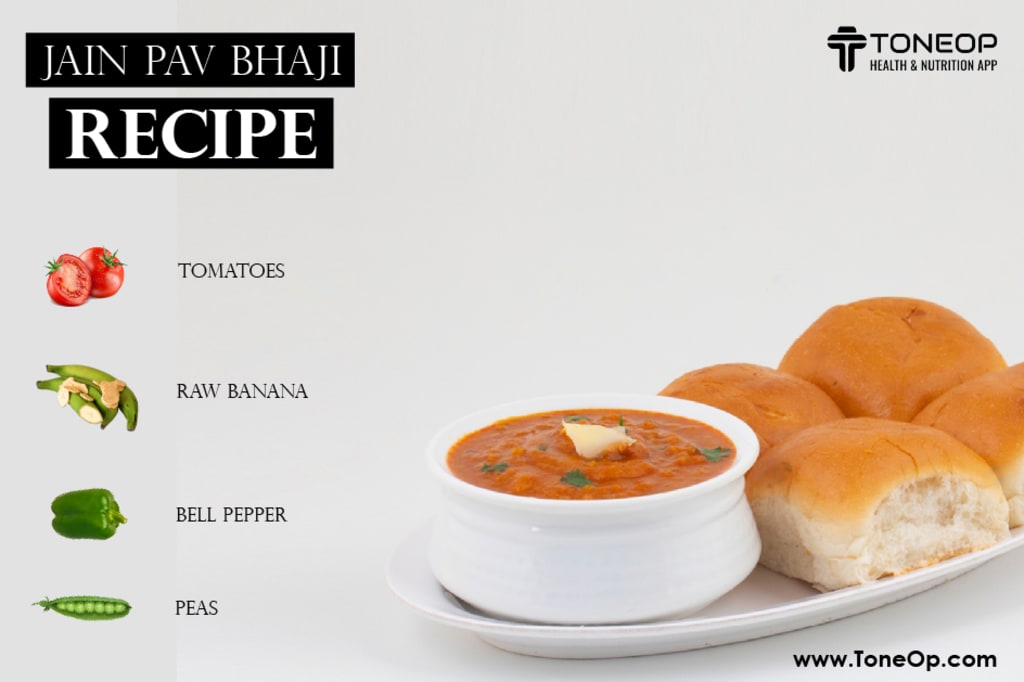Jain Pav Bhaji Recipe
The Culinary Traditions Of Jainism

The Jain culture surrounding food is extremely precise. However, were you aware that in addition to avoiding eating meat and other products that are not vegetarian, Jains also do not eat vegetables that grow underground, such as potatoes, onions, and garlic? Continue reading if you want to learn more.
The majority of Jains adhere to a lacto-vegetarian diet. The followers of Jainism have a strong commitment to non-violence and make it a point to avoid hurting or killing any animals, insects, or other organisms. In Jain food culture, vegetarianism is an absolute requirement for all participants. They believe that onions and garlic contain a heat-producing element that disrupts one's ability to maintain mental calm and causes one to experience anger and other feelings.
It was discovered in 2021 that 92% of self-identified Jains in India followed a vegetarian diet. Another 5% tried to follow a primarily vegetarian diet by avoiding certain types of meat and/or eating meat on specific days. The findings of these studies were published in the year 2021.
The Culinary Traditions Of Jainism
It is estimated that Jainism is the sixth most practised culture in the world. In addition, a high literacy rate in comparison to that of all the other Indians has been observed in a more significant number of Jain people. They do not consume onions, garlic, or other vegetables that grow underground.
Jain people adhere to a strict vegetarian diet and other rigorous eating habits, following the Jain way of life can be challenging. Jains do not consume water that has not been filtered. Instead, they prefer always to drink water that has been boiled. According to the teachings of their religion, it is forbidden for them to consume foods derived from animals, including some dairy products.
What Kinds Of Foods Do Jains Refuse To Consume?
As these vegetables are grown underground, Jains do not eat potatoes, beets, garlic, or onions. Jains do not harm living things because they believe nonviolence should be promoted. Therefore, due to the presence of microorganisms, they do not consume vegetables that grow underground.
They also believe that if underground vegetables were to be dug up, it would result in the death of the entire plant. In addition, as was mentioned earlier, onions and garlic, being of Tamsen origin, both contain compounds that generate heat on their own. According to the holy Gita, one should not take in their nourishment as a result.
Jains do not consume stale food. In addition to this, they do not eat after the sun has set. They believe harmful microorganisms begin to proliferate on food after the sun goes down, so eating before the sun goes down is best. Therefore, food must be eaten before sunset.
Which Nutrients Do Jains Get From Their Diet?
Jain pav bhaji consists primarily of fruits and vegetables that naturally grow on trees and make their way to the ground. These fruits and vegetables must not be picked straight from the tree. Instead, they should allow themselves to fall to the ground independently. As the crops dry out, it is possible to consume various grains and pulses.
Jain Pav Bhaji Recipe
ToneOp brings an amazing Jain pav bhaji recipe to try and treat your taste buds.
Ingredients
Raw banana, boiled and mashed - 1 banana
Chopped capsicum- 1 medium
Tomatoes (deseeded)- 2 medium
Coriander leaves- 3 tbsp of
Green peas- ¼ cups
Butter- 1 tbsp
Turmeric powder- 1 tbsp
Red chilli powder- ¼ tsp
Ghee- ½ tsp
Pav bhaji masala - 2 tsp
Garam masala - 2 tsp
Cumin seeds - ½ tsp
Pav- 2 to 3
Preparation Method
1. First, get a pan and put some ghee in it. Then, put some cumin seeds in it and let them get a little bit brown. After that, put some capsicum and sauté it for two to three minutes. Add the mashed and boiled bananas, and mix everything thoroughly. Allow it to cook for two to three minutes.
2. Sprinkle in some salt and thoroughly combine.
3. Add the spices (red chilli, pav bhaji masala, garam masala, and turmeric powder) and the chopped coriander leaves. Combine thoroughly, then continue to cook for a while.
4. After adding the green peas and tomatoes, pour water over the mixture. If necessary, season it with salt, thoroughly mash all the ingredients, and then put it on low heat for some time.
5. Divide the pav into two equal parts using a knife and roast it.
6. Before serving the pav-bhaji, garnish it with some lemon juice and coriander seeds that have been chopped.
The Bottom Line
To be considered a devout follower of Jainism, one must adhere to a number of stringent rules and guidelines. For instance, this religion's consumption of many different types of food is frowned upon because Jainism is based on the principle of non-violence.
This principle dictates that one should not intentionally or unintentionally cause harm to any other person, insect, plant, or microorganism. Because of this, the foods they consume are very different from those associated with other religions.
About the Creator
toneop 12artical
ToneOp is an initiative designed to keep
you fit & healthy through a vast collection of comprehensive offerings,
including 100% customisable region-based diet plans for multiple health goals.





Comments
There are no comments for this story
Be the first to respond and start the conversation.